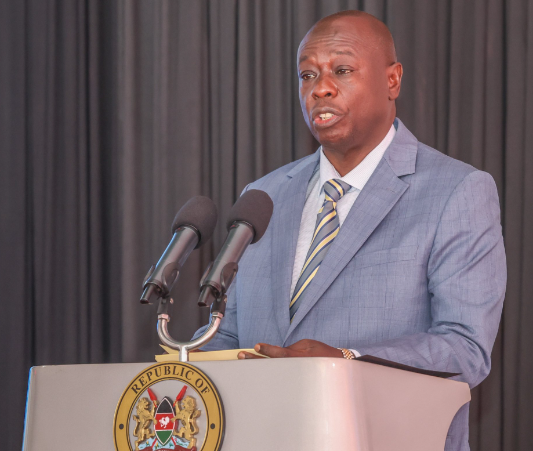
By LUKE AWICH
Deputy President Rigathi Gachagua finds himself in an increasingly precarious political position following his overwhelming impeachment in the National Assembly on Tuesday.
As the dust settles, the gravity of his situation becomes clearer: his political future hangs by a thread, and the options for a dignified exit are rapidly diminishing.
Impeachment carries severe consequences; it would not only bar Gachagua from holding any public office permanently, but would also strip him of his exit benefits.
With key political figures, including his boss, President William Ruto, publicly backing his removal, observers are suggesting that resignation may be his best option to salvage what remains of his political career.
Former Naivasha MP John Mututho weighed in on the matter, urging Gachagua to resign with humility.
“What I would urge Gachagua, with a lot of humility and respect, is to resign quietly and not face all these hullabaloos we are going to hear,” he said.
A resignation would not only preserve his exit benefits but also provide Gachagua with a potential pathway to re-enter politics in the future.
However, Gachagua has firmly ruled out stepping down, vowing to fight against what he perceives as a politically motivated attack.
“I have no intention whatsoever to resign from this job. I will fight to the end,” he declared during a press conference at his official residence in Karen on Monday night.
The Senate is set to conduct the trial starting Wednesday, with Gachagua facing 11 charges that could seal his political fate.
Under the law, an impeached state officer is permanently barred from holding any public office.
Chapter Six, Article 75(3) of the Constitution states, “A person who has been dismissed or otherwise removed from office for a contravention of the provisions specified in clause (2) is disqualified from holding any other State office”.
This provision has been reinforced by the Supreme Court in cases like that of former Nairobi Governor Mike Sonko, who was also barred from public office after impeachment.
Gachagua’s predicament is further complicated by the legal precedent set in Sonko's case, which affirmed that the Constitution's integrity must be upheld.
The court ruled that, “Chapter Six of the Constitution was not enacted in vain or for cosmetic reasons. The authority assigned to a state officer is a public trust...”
As he prepares for the Senate trial, Gachagua's resolve will be tested.
Political analysts like governance expert Javas Bigambo suggest that resignation could be a strategic move.
“If Rigathi resigns now it may be better for him; if he resigns after senators start the process he might find himself in hot soup,” Bigambo explained, emphasising that the Senate is unlikely to show leniency.
There remains uncertainty regarding whether Gachagua’s impeachment would be nullified if he chooses to resign.
Bigambo believes that the process would only terminate if Gachagua resigns before filing his response to the charges.
In contrast, constitutional lawyer Ekuru Aukot argues that the impeachment could collapse at any stage if the Deputy President resigns.
“If there is nobody to try, how do you try an absentee?” Aukot questioned, highlighting the legal intricacies involved. Rarieda MP Otiende Amolo echoed Aukot's sentiments, stating, “In my opinion, at any time before the process comes to finality it will always be open for a person to resign”.
However, he cautioned that resignation would not preclude investigative agencies from pursuing any allegations made during the impeachment.
As Gachagua navigates this tumultuous period, he is also considering a legal challenge against the impeachment proceedings.
His legal team is closely monitoring the process to identify any potential missteps that could be grounds for court intervention.
In recent public appearances, Gachagua has expressed faith in the judiciary, stating, “Kenya is a country of the rule of law. I have faith in our courts of law”.
Gachagua’s rise to prominence has been marked by his outspoken nature, which he claims is a double-edged sword.
Before entering politics, he was relatively unknown outside his Mathira constituency.
His political career gained momentum in the lead-up to the 2022 elections when he openly opposed former President Uhuru Kenyatta’s support for Raila Odinga, instead aligning himself with Ruto.
Despite his earlier success, Gachagua has faced criticism for his brash and aggressive demeanour.
Detractors argue that such traits have alienated him from fellow politicians, a claim he vehemently denies.
“All I do is speak the truth,” he asserts, defending his approach as a necessary stance against political complacency.
As the Senate trial looms, Gachagua's political future remains uncertain.
His refusal to resign could lead to a drawn-out battle that may ultimately seal his fate.
With resignation appearing to be the more prudent choice, Gachagua’s determination to fight could either be a testament to his resilience or a precursor to his political downfall.
The coming days will be crucial for Gachagua, as he prepares to present his case before the Senate.
Political analysts and observers alike are watching closely, aware that the outcome of this trial will not only determine Gachagua's future but could also reshape the political landscape in Kenya.
His fate hangs in the balance, and the decisions he makes now will resonate far beyond the walls of the Senate.









